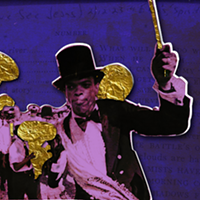King Lear (***1/2) — Reviewing a play or an opera at the Brooklyn Academy of Music has been on my New York bucket list for quite a few years, so I was quite excited when I was able to score two bookings this year, both of them final performances of distinguished British imports. The Glyndebourne Festival Opera's production of Billy Budd had settled in for a four-performance run just two days before the Chichester Festival Theatre's Lear finished its five-week run at BAM.
Of course, the main attraction wasn't an import at all — Frank Langella in the title role. Unlike some of his more notorious roles, say Nixon or Dracula, Lear is famously "more sinned against than sinning," but coming on strong in the epic first scene, divvying up his kingdom among his deceitful daughters and casting away those who truly love him most, Langella made the gap as narrow as one dares. The curses he rained down on his daughters were thunderbolts. Two frosty Brit wenches, Catherine McCormack as daughter Goneril and especially Lauren O'Neil as Regan, helped keep the balance between sinned against and sinning teetering for as long as I've seen. Why if you hadn't seen this tragedy before, you might even hope that Regan would offer Lear some hospitality after his harsh treatment chez Goneril.
Or that could have been a case of freshly empathizing with Langella's disintegrating Lear. Nudging that disintegration further was an excellent Harry Melling as Lear's mocking Fool. Also fine was Max Bennet as the Machiavellian bastard Edgar — so fine that I was more interested in the wicked Edmund-Goneril-Regan love triangle than in the abused Gloucester and his legitimate heir Edgar. The other Brits were quite acceptable, except for Isabella Laughland as Lear's true Cordelia, too lackluster in her plain speaking for the King of France to say, "She is herself a dowry."
Aside from that casting choice, Chichester director Angus Jackson's concepts, with Robert Innes Hopkins' set and costume designs, meshed well with BAM's charming old Harvey Theatre, nee the Majestic Theater when it first opened in 1904. When Langella launched into Lear's signature defiance of the wind and the rain, he was drenched in a merciless torrent of water from the flyloft, beautifully lit by Peter Mumford as Langella faced away from us.
Not so flawless was Jackson's editing, which cut too much of Lear's madness. I particularly missed the farmhouse episode where the King puts the offending Goneril — or a wooden stool —on trial. A sorry echo of the regal opening scene, it's a landmark reminding us, after all the humiliations during Lear's nightmarish journey, of the difference between irrationality and insanity. (Closed February 9)
Saint Joan (***1/2) — George Bernard Shaw always kept a firm grip on his characters, his stories, and the ultimate messages they were to convey. So it's quite a treat to see Shaw, for once, letting the story of Joan of Arc grab hold of him. For exactly three hours, with two intermissions. Aided by a minimum of scenery at the Lynn Redgrave Theatre, none of it remotely simulating the period of her greatest triumph in May 1429, we watch an illiterate farm girl who briefly became the salvation of France. Joan accomplishes this largely by sheer force of will, fueled by the conviction that she is fulfilling the dictates of Saint Margaret, Saint Catherine, and the archangel Michael, all of them voices sent by God.
"She is so positive!" marvels the servant of Robert de Baudricourt, the first skeptic Joan must overcome to raise an army, lift the British siege on Orléans, and crown the young Dauphin as Charles VII in the Holy Cathedral of Rheims. Joan's positive thinking is fortified by a sprinkling of miracles that follow in her wake: de Baudricourt's hens, long unproductive, begin laying again; the timid Dauphin sprouts a backbone; and to the astonishment of the fleet's commander Dunois, the wind that has been preventing them from raising the siege turns their way — the instant he agrees to follow her into battle.
The middle act is devoted to the deliberations of the English as they struggle to understand "La Pucelle" and plot to capture her. Longest of all, the final act dramatizes Joan's witchcraft trial before covering her posthumous vindication and, in 1920, her elevation to sainthood three years before Shaw wrote his tragedy. At each intermission, the hall is cleared and reconfigured so that you're in a different seat for each of the three segments.
Bedlam Theatre uses just four performers — Andrus Nichols, Eric Tucker, Edmund Lewis, and Tom O'Keefe — to play 22 roles. Nichols gives us a rustic, somewhat mannish Joan whose eloquence is sparked by her unshakable convictions. Or so it seems until the turning point of her trial, which unmistakably prefigures the denouement in Arthur Miller's The Crucible — with its moments of wavering followed by a full embrace of martyrdom. Tucker plays the two persuadable skeptics in Act 1, de Baudricourt and Dubois, changing colors only slightly in Act 3 when he's the Inquisitor who most ardently wishes to save Joan from the stake.
Lewis changes from the irresolute Dauphin to John de Stogumber, the most rabid advocate of burning Joan as a witch. Yet he delivers what now stands for me as the most moving moment I've seen in Shaw, when he returns from the execution and realizes the horror he has perpetrated. Tucker directs brilliantly, injecting punkish comedy into the scene changes by deploying a bored stagehand who plays unnecessary stuff on a portable cassette player.
Less welcome comic relief comes when the actors suddenly switch from one character to another in mid-stride or mid-sentence, dumping us abruptly into the world of Reduced Shakespeare spoofery. Ironically, Bedlam is presenting Hamlet – the tragedy that draws the most sustained fire from the Reduced comedians — in rolling rep with Saint Joan. Those sudden switches are probably less rotten in Denmark, where we're already familiar with the characters. (Closing March 9)
Handle With Care (***1/4) — Jason Odell Williams is a gentile playwright who writes insightfully about Jews. He also knows how to beautifully construct a romantic Hollywood storyline, so that Handle With Care ends up as a bittersweet comedy that mixes sugary providence, salty ethnic humor, and a touch of pure schmaltz. They're all so exquisitely equalized that you can perceive Williams' balancing act in a thumbnail sketch of the plot: a lapsed American Jewish man and an Israeli sabra meet by pure chance in Goodview, Virginia, and realize they are meant for each other in the space of a few precious hours — on Christmas Day.
What brings Ayelet and Josh together is his old screw-up friend Terrence. We will learn in flashbacks to December 24 what Ayelet and her grandma Edna are doing in Virginia, but it's enough to know early on that Grandma has died and Terrence, a DHL driver, has managed to lose both the truck and Edna's coffin. Josh, a widower, must first break through his misperception that Terrence is trying to set him up with Ayelet. Then he must overcome the fact that Ayelet, who already despises the slovenly Terrence, hardly speaks a word of English.
Charlotte Cohn is quite the gem as Ayelet, having played her twice before the director Karen Carpenter brought her to New York. And why not? Speaking a fluent Hebrew, Cohn very likely deserves a co-writer credit. She's tough as steel when we first see her, softer when we flash back to the scenes with her grandmother (rendered in English), and stealthily amorous as she warms up to Josh. Jonathan Sale is definitely a dreamboat as Josh, with a patina of politeness even when he's stressed or frustrated and an instinctive feel for what makes a romantic comedy leading man.
Broadway legend Carol Lawrence had top billing as Edna, but she presumably also had the flu on the night we braved the weather. So we settled for Geraldine Librandi, who offered a rich, loving warmth, a sprinkling of Jewish overprotection, and a flicker of charisma. Sheffield Chastain was purebred redneck as Terrence and a born underling. He rightly sees himself in the mold of Clarence, the bumbling apprentice angel of It's a Wonderful Life. Don't worry yourself over whether he earns his wings. (Closing March 9)
Riding the Midnight Express (**3/4) — Billy Hayes believed he was following in the footsteps of Jack London, lapping up adventures to write about, when he took up drug smuggling. The adventure was more than he bargained for when he was arrested in 1970 at the Istanbul airport with four kilos of prime hashish taped to his body and sentenced to four years in prison. After serving two grueling years, Billy was dragged back to court, where he hoped to be granted an early release. Instead he was retried — none of that double jeopardy crap in Turkey, pal — and given a 30-year life sentence.
Plan B, Billy's escape from captivity in 1975 was the stuff of an exciting 1977 autobiography, Midnight Express — and the screenplay by Oliver Stone that won the 1979 Oscar. Last fall, Hayes found another way to tell his story, doing an acclaimed one-man show at the Edinburgh Fringe Festival. The show, directed by John Gould Rubin, is time-sharing at St. Luke's Theatre, where Hayes proves as adept at performing as he is at writing.
At a rapid-fire pace, Billy tells us what Stone changed in his script, debunking the authenticity of the film's courtroom tirade against Turkish justice, and giving us the real lowdown on how he escaped from an island insane asylum. The movie wasn't right about the place or the method. He extols the life-saving consolations he found in yoga and stays after his 70-minute performance for an additional 20-minute Q&A session.
Packaged that way, the show feels like a healthy cautionary tale best suited for a high school gym or auditorium, where many in the audience might be considering drug-dealing or smuggling as a career choice. I couldn't escape the feeling that the show is merely a new package for old goods. Closing in on 45 years after his youthful resolution, Hayes might do well to get back to that Jack London thing. He's clearly got the talents, but it's time to move on to a new subject. (Through March 23)
Speaking of...
Latest in Theater
More by Perry Tannenbaum
Calendar
-
An Evening With Phil Rosenthal Of "Somebody Feed Phil" @ Knight Theater
-
Kountry Wayne: The King Of Hearts Tour @ Ovens Auditorium
-

NEW WINDOW GALLERY-Pat Rhea-ACRYLIC PAINTINGS-April 05-30 2024 VALDESE, NC 28690 @ New Window Gallery/Play It Again Records
- Through April 30, 12 p.m.
-

Trap & Paint + Karaoke @ Zodiac Bar & Grill
-

LIVE MUSIC FRIDAYS!!! @ Elizabeth Parlour Room
-
Susan Brenner Examines Upheaval While Celebrating Trees
Chaos and beauty
-
Jessica Moss Makes the Gantt Center a Safe Zone for Local Artists 2
Flipping the script
-
Breaking the Moon musical brings light to dark side 12
A Teenie Galaxy


















